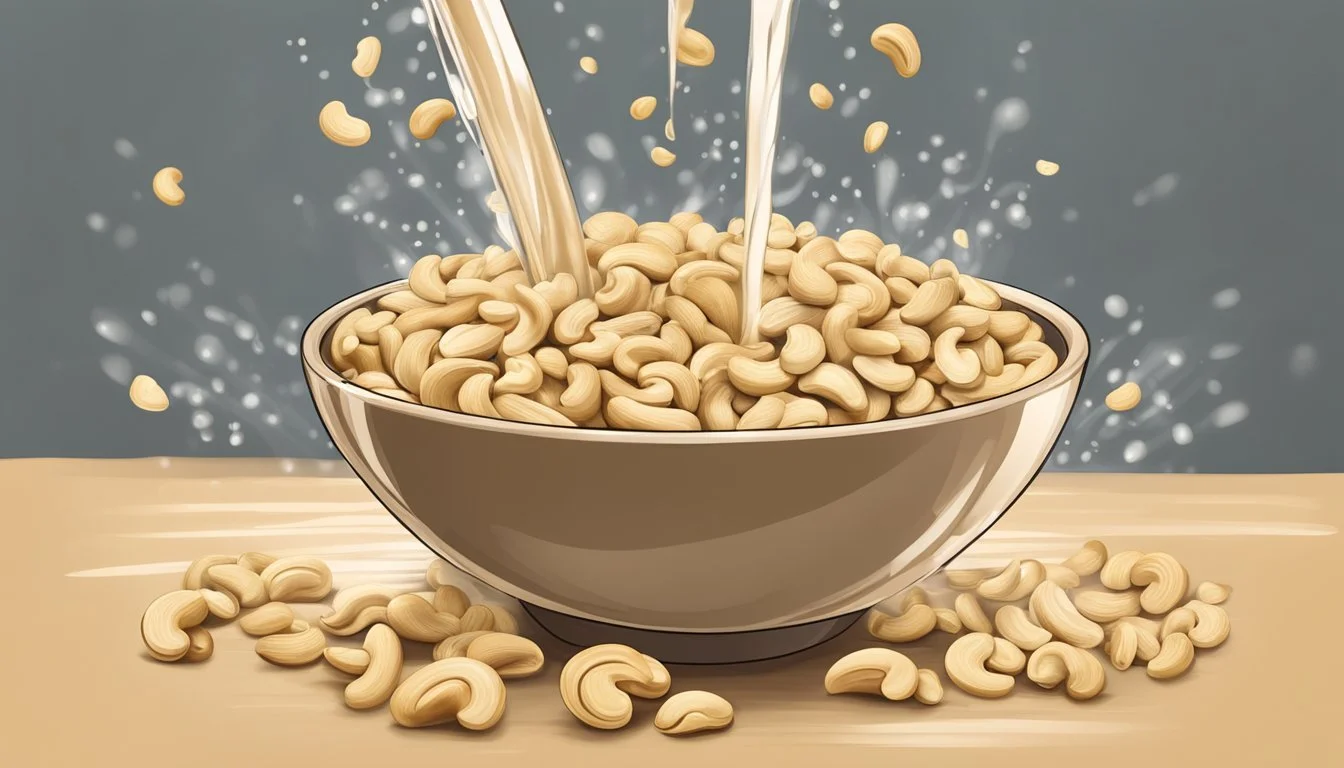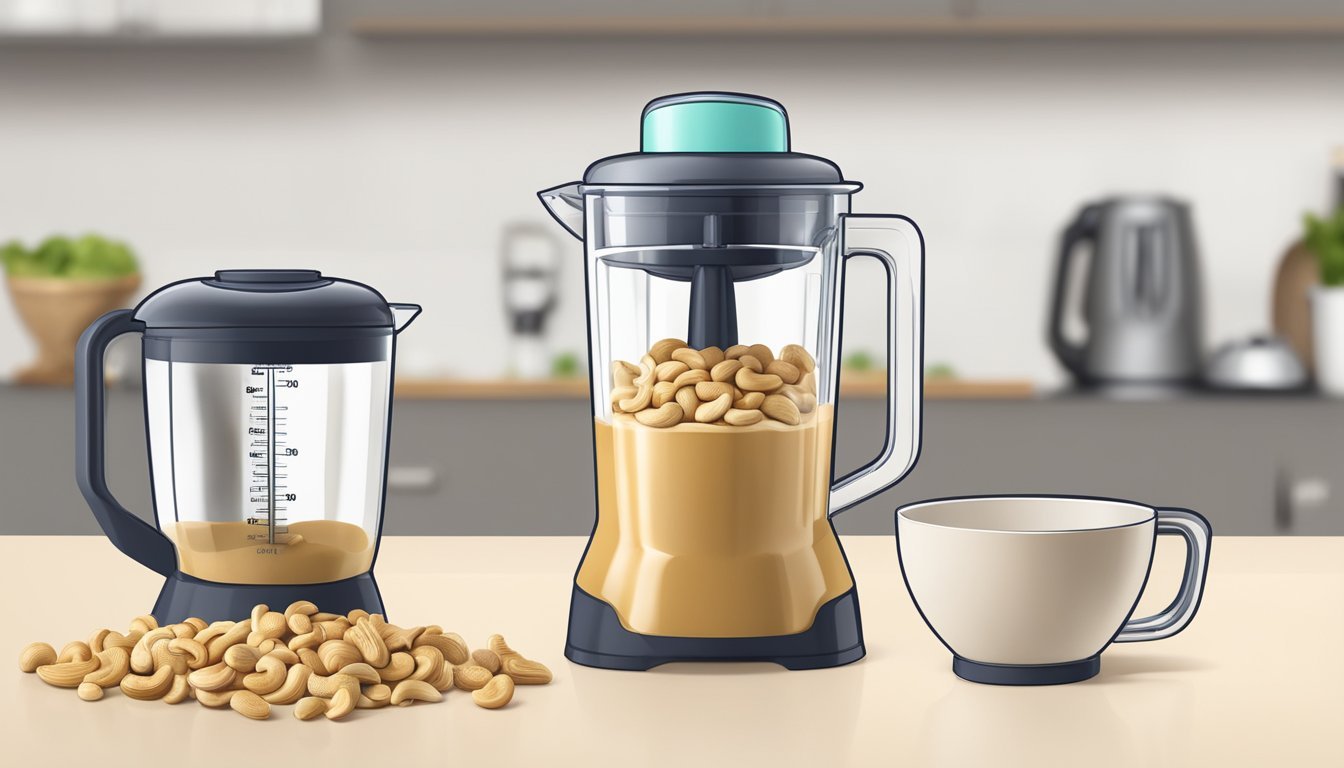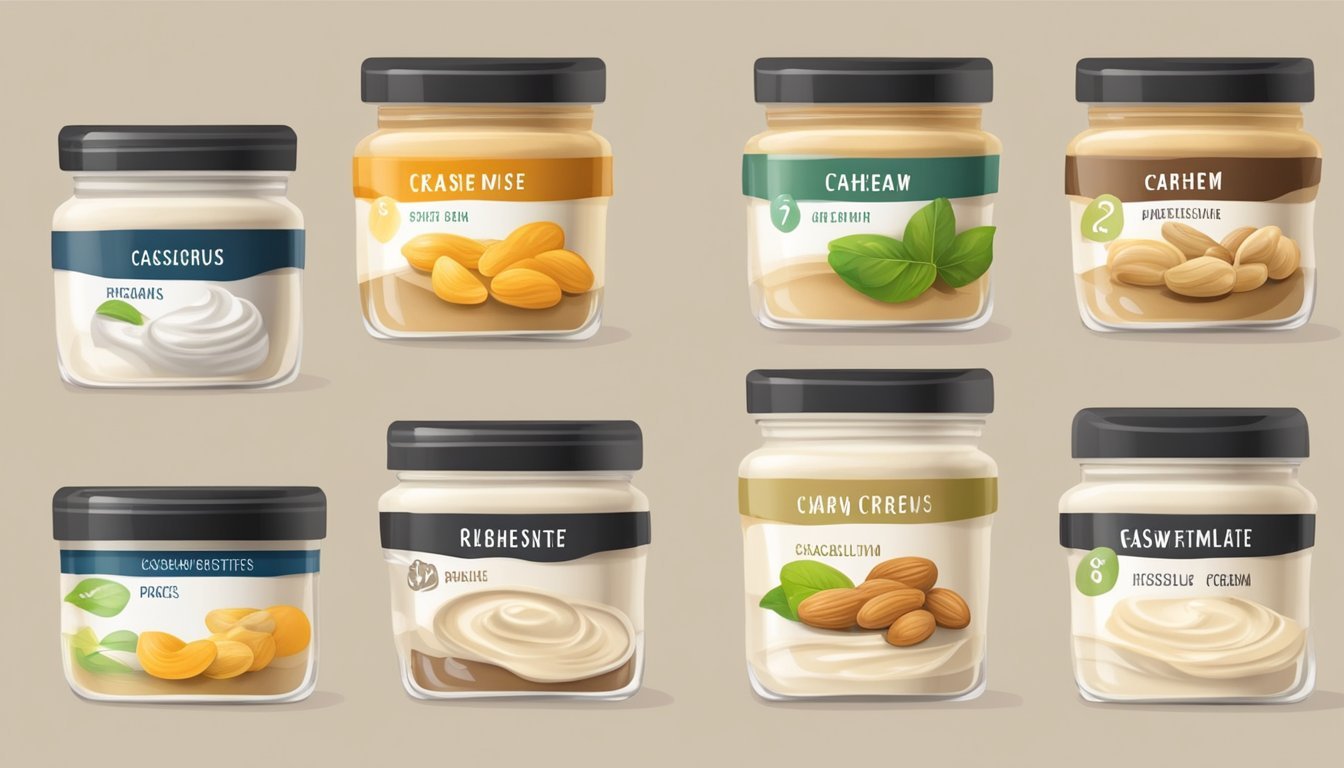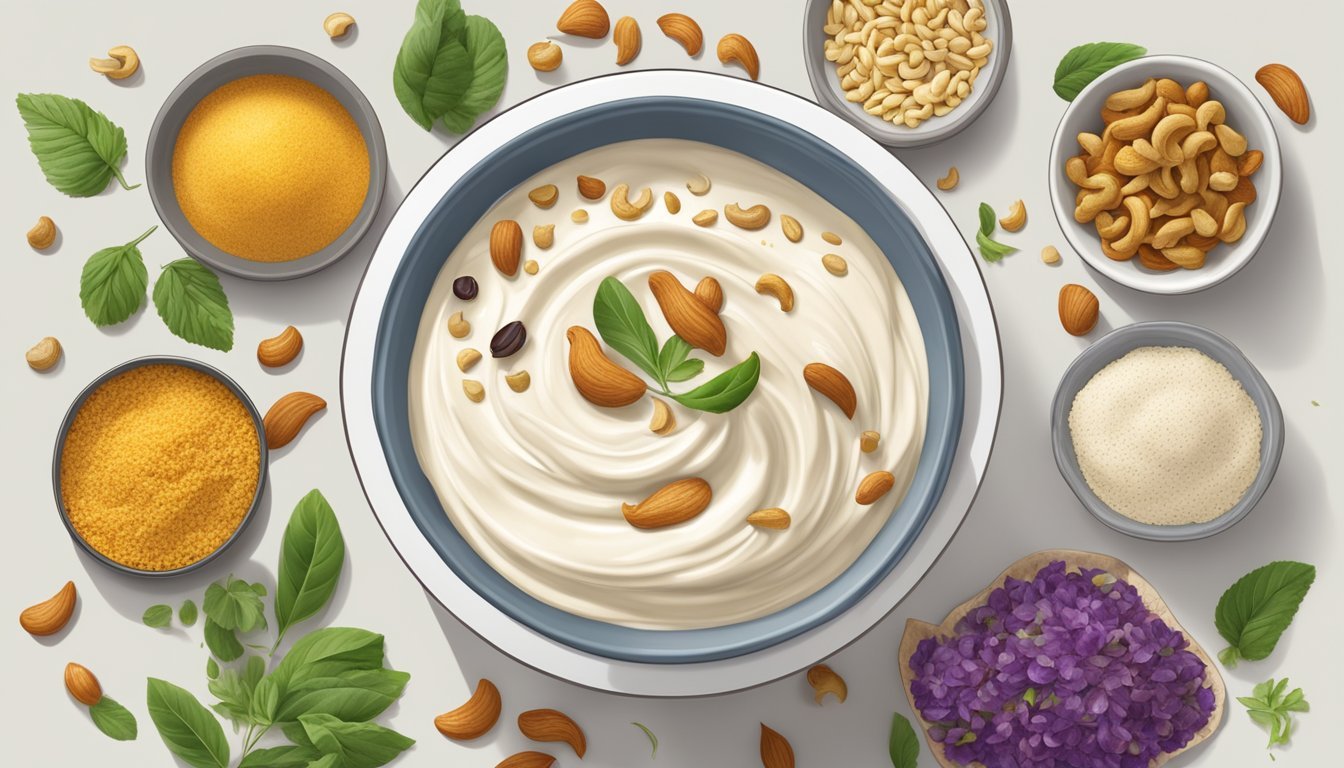Cashew Cream Substitutes
Top Dairy-Free Alternatives for Your Recipes
Cashew cream has risen in prominence as a versatile ingredient in the culinary world, especially among those seeking dairy-free or vegan alternatives. It is prized for its creamy texture and mild, nutty flavor, making it a staple for a wide range of recipes, from savory sauces to luscious desserts. However, allergies, preferences, or simple unavailability may necessitate the search for suitable substitutes that still provide comparable richness and consistency.
Several non-dairy alternatives can mimic the characteristics of cashew cream effectively. Silken tofu stands out for its smooth texture that blends seamlessly into dishes, presenting an excellent option for those looking for a protein-rich substitute without compromising on creaminess. Another feasible alternative is combining non-dairy milk with cornstarch, which delivers a thickened consistency ideal for recipes that require heavy cream. For those who can consume nuts but are specifically avoiding cashews, options like pistachio cream can offer a similar flavor profile and velvety texture.
Understanding Cashew Cream
Cashew cream, often noted for its smooth creaminess, functions as a key ingredient in various recipes, particularly for those seeking plant-based alternatives to dairy products. It combines the rich, luscious texture of cream with the added nutritional benefits of nuts.
Nutritional Value
Cashew cream is crafted from cashews, which are rich in protein, fiber, and beneficial fats. The nutritional profile of cashew cream includes a variety of vitamins and minerals such as vitamin C, iron, and magnesium. The table below details the key nutrients present in cashew cream:
Nutrient Benefit Protein Supports muscle repair and growth Fiber Aids in digestion and satiety Vitamin C An antioxidant that supports immunity Iron Crucial for blood production Magnesium Important for bone health and metabolism
In terms of macronutrients, the cream is predominantly comprised of carbohydrates and fats, along with a significant amount of water, which contributes to its creamy texture.
Culinary Uses
Cashew cream is highly versatile in the culinary world, owing to its dense, creamy consistency and its capacity to enrich flavors. Chefs and home cooks utilize it in:
Baking recipes to replace milk or heavy cream for a richer, dairy-free dessert.
Vegan whipped cream by incorporating sweeteners and vanilla, then whipping it to a fluffy consistency.
Sauces, soups, and salad dressings, where it serves as a creamy, flavor-enhancing base.
The product’s neutral taste also allows it to absorb and complement a variety of flavors, making it suitable for savory and sweet applications alike.
Key Ingredients and Preparation
To make a successful cashew cream, one must focus on the quality of the cashews and the equipment used for blending to achieve a smooth consistency. The preparation process centers around soaking the cashews and employing an efficient blending technique.
Cashews and Soaking
Cashews are the cornerstone for making cashew cream. They should be fresh and of high quality for the best flavor and texture. Before blending, cashews need to be soaked. This process softens them and ensures a creamy final product. The soaking can be done in hot water for 10 minutes or in room temperature water for 2 hours up to overnight. One crucial aspect is to drain the cashews thoroughly after soaking to prevent a watered-down cream.
Blending Technique
To transform soaked cashews into cream, one utilizes a blender. A high-speed blender is preferable as it will ensure a smooth and homogenous consistency without lumps. For blending, combine the soaked cashews with 1 cup of water or non-dairy milk, and blend for 1-2 minutes until completely smooth. If the mixture is too thick, additional liquid can be added in small increments until the desired thickness is achieved.
Primary Cashew Cream Substitutes
When considering alternatives to cashew cream, one must prioritize substitutes that offer a similar consistency and nutritional profile. The following primary substitutes are well-regarded for their ability to replicate the creamy texture and richness in various recipes.
Coconut Cream
Coconut cream is a rich, dairy-free substitute for cashew cream with a higher fat content, providing a similar creamy texture. It is an excellent option for those seeking a vegan substitute, especially in dishes where coconut's distinct flavor complements the overall taste profile. It's commonly used in soups, sauces, and desserts.
Silken Tofu
Silken tofu has a smooth, creamy consistency, which makes it a suitable dairy-free and vegan alternative to cashew cream. Its mild flavor allows it to absorb other flavors easily, making it versatile for both savory and sweet applications. Silken tofu is also a nutritious option, high in protein and low in fat.
Heavy Cream Substitutes
For recipes requiring a closer match to dairy-based heavy cream, a blend of vegan heavy cream substitutes can be used. These may include a mixture of non-dairy milk with plant-based oils or commercially available vegan heavy cream alternatives. These substitutes are designed to mimic the rich texture and mouthfeel of traditional heavy cream without any dairy ingredients.
Plant-Based Milk Alternatives
In the realm of non-dairy milks, a few standout options provide versatility and richness suitable for replacing cashew cream in various recipes. They are almond milk, soy milk, and oat milk, each bringing its unique properties to the table.
Almond Milk
Almond milk is a popular non-dairy alternative known for its light texture and nutty flavor. It's lower in calories and fat compared to cashew milk, making it a suitable choice for those looking to reduce their caloric intake.
Key Nutritional Facts (per 1 cup):
Calories: Approximately 30-50
Fat: 2.5 grams
Protein: 1 gram
Common Uses: Ideal for cereals, smoothies, or light baking tasks where a hint of almond flavor is appreciated.
Soy Milk
Soy milk stands out with its high protein content, closely mirroring the nutritional profile of cow's milk. This makes it a robust substitute for cashew cream.
Key Nutritional Facts (per 1 cup):
Calories: Approximately 80-100
Fat: 4 grams
Protein: 7 grams
Common Uses: Works well in savory dishes, coffee, and heavy cream applications due to its thicker consistency.
Oat Milk
Oat milk, derived from whole oat grains, offers a naturally sweet and mild flavor. Its creaminess closely resembles that of cashew milk, which is useful for those seeking a similar texture without the nuts.
Key Nutritional Facts (per 1 cup):
Calories: Approximately 100-120
Fat: 5 grams
Protein: 3 grams
Common Uses: A favorite for baristas due to its ability to froth, it is also excellent for baking and making luxurious sauces.
Other Cream Substitutes
When searching for alternatives to cashew cream, one must consider a variety of nut-based and seed-based options as well as other non-dairy substitutes that satisfy culinary needs, from vegan creams to nut-free versions, ensuring both texture and flavor are appropriately matched.
Nut-Based Alternatives
Macadamia Nuts: A viable cashew cream substitute, macadamia nuts offer a rich, buttery flavor and can be blended into a creamy consistency suitable for both sweet and savory dishes.
Peanuts and Walnuts: Both can serve as a base for homemade cream substitutes. However, they impart a more distinct taste, which may not make them ideal for every recipe.
Seed-Based Alternatives
Sunflower Seeds: As a nut-free version, sunflower seeds are ideal for those with allergies. They possess a mild flavor and yield a creamy product when soaked and blended.
Sesame Seeds: Ground sesame seeds, also known as tahini, can be diluted to mimic the creaminess of heavy cream, though it does carry a noticeable sesame flavor.
Non-Dairy Options
Silken Tofu: This non-dairy alternate is well-suited for those seeking a versatile vegan substitute for heavy cream. Its neutral taste and creamy consistency make it a steadfast option for various culinary applications.
Coconut Cream: Another dairy-free substitute, coconut cream works well for most recipes requiring a thick, creamy consistency. However, it imparts a coconut flavor that may not be desired in all dishes.
Recipes and Applications
Substituting cashew cream in various recipes offers a versatile approach to either dairy-free cooking or enhancing flavors in traditional dishes. It blends seamlessly into both sweet and savory contexts, providing a creamy texture or added richness to sauces, soups, desserts, and baked goods.
Sauces and Soups
In savory dishes like alfredo sauce or creamy soups, cashew cream serves as a robust heavy cream alternative, contributing the desired thickness without overpowering the dish's natural flavors. Home chefs can incorporate it directly into recipes such as:
Mushroom Alfredo Sauce: Use cashew cream in place of dairy cream, maintaining a thick, rich texture that clings to pasta.
Curry: Add cashew cream to thicken and enrich the sauce, complementing the spices without diluting their intensity.
Desserts and Baked Goods
For desserts, cashew cream can replace heavy cream to achieve a similar mouthfeel and moisture in recipes. It acts as a binder and enriches the nutritional profile of sweet treats such as:
Cheesecakes: Incorporate cashew cream to yield a dense, creamy filling, perfect for those seeking a dairy-free option.
Mashed Potatoes: Swap in cashew cream to create creamy, velvety mashed potatoes with an added layer of subtle nuttiness.
When baking with cashew cream, one should account for the slight flavor difference, although it is typically mild enough not to overwhelm the sweet elements of the dessert.
Special Considerations
When choosing cashew cream substitutes, consider how allergies and dietary restrictions impact selection, and be mindful of the storage protocols to ensure longevity and freshness.
Allergies and Dietary Restrictions
Persons with nut allergies should avoid cashew cream and its substitutes derived from nuts altogether. They may opt for dairy-free, vegan alternatives such as coconut milk or soy-based products if they do not have related allergies. Substitutes like soy-based sour cream can cater to those seeking both dairy-free and vegan options, provided there are no soy allergies.
Storage and Shelf Life
To maintain the substitute's quality, store the product in an airtight container within the refrigerator. Homemade substitutes generally last for up to 5-7 days. Commercial substitutes may last longer; always check the expiration date for guidance. Freezing is not recommended as it can alter the texture and consistency.
Comparing Cost and Accessibility
In exploring cashew cream substitutes, one should consider both economic and availability aspects to determine the most feasible option.
Store-Bought vs Homemade
Store-Bought:
Cost: Store-bought cashew milk like Pacific Foods tends to be more costly than homemade alternatives due to branding and additional ingredients included to enhance flavor and preservation.
Accessibility: Widely available in most health food stores and larger supermarket chains. Additionally, options like coconut milk are often found in both regular and organic varieties.
Homemade:
Cost: Typically more cost-effective, especially when purchasing nuts in bulk. No additional costs for marketing or distribution are factored in.
Accessibility: Requires sourcing of raw ingredients. While cashews or macadamia nuts might be readily available in bulk stores or markets, other ingredients like silken tofu may vary in accessibility.
Availability and Alternatives
When comparing substituting products, availability can fluctuate greatly depending on the region, store, and time of year.
Alternatives:
Silken Tofu: Often found in the refrigerated section of the grocery store, relatively inexpensive, but may not be as widely available.
Coconut Cream: Common in most grocery stores, especially in areas with a higher demand for a variety of culinary products.
Macadamia Cream: May be less accessible and pricier due to the nut's luxurious reputation; however, it is an excellent substitute due to its rich and buttery flavor profile.
By understanding these factors, consumers can make informed decisions that align with their dietary requirements and budget constraints.
Enhancing Flavor and Texture
When substituting cashew cream, one must consider not only the consistency but also how the alternative will affect the overall taste and texture of the dish. The key lies in thoughtful seasoning adjustments and the wise use of thickening agents to achieve the desired creamy richness without overpowering the primary flavors of the recipe.
Seasoning Adjustments
With substitutes, the flavor profile can vary widely; hence, they carefully adjust seasonings to match the distinct taste that cashew cream imparts. A mild substitute like macadamia nuts brings a nutty flavor and richness similar to cashews, which can be enhanced with a pinch of salt. For a brighter note, a squeeze of lemon juice not only adds freshness but also can cut through the richness if needed.
Salt: Enhances inherent flavors, use sparingly to avoid overpowering the dish.
Sugar: Balances the nuttiness and can round out bitterness in some substitutes.
Lemon Juice: Adds a fresh, zesty flavor that complements creamy textures well in salad dressings and sauces.
Thickening Agents
If the substitute lacks the natural creamy consistency of cashew cream, thickening agents are employed to achieve a similar texture. Additives like cornstarch are commonly used as they thicken without altering the flavor significantly. When working with a liquid substitute, it's important to incorporate these agents gradually to avoid over-thickening.
Cornstarch: A neutral-flavored thickener; combine with cold water before adding.
By focusing on these elements, one can seamlessly incorporate cashew cream substitutes into their cooking, maintaining both the indulgent texture and harmonious flavors of the original recipe.
Nutritional and Health Considerations
When considering cashew cream substitutes, it's important to focus on their nutritional profile, particularly the calories and fat content, as well as their vitamin and mineral contribution to the diet.
Calories and Fat Content
Cashew cream substitutes vary in calorie and fat content. For instance, coconut milk, a common alternative, is high in saturated fat but offers a creamy consistency similar to cashew cream. It contains approximately 94 calories and 7 grams of fat per serving. On the other hand, cashew milk offers a lower-fat option, typically free from common allergens such as soy and gluten, making it suitable for those with specific dietary restrictions.
Vitamins and Minerals
In terms of vitamins and minerals, substitutes for cashew cream such as macadamia nut blends can provide comparable levels of essential nutrients. Blended macadamia nuts are not only rich in healthy fats but also contain vitamin B6, calcium, and magnesium—all critical for bone health and energy metabolism. Full-fat yogurt, another substitute, contributes protein and is often fortified with vitamin D and additional calcium. However, these alternatives might have varying levels of sugar and fiber, which should be considered based on individual health goals and dietary needs.
Making Cashew Cream at Home
Cashew cream is a versatile, dairy-free substitute that can enhance various recipes from soups to desserts. Making it at home requires minimal ingredients and a straightforward process.
Step-by-Step Guide
Ingredients:
Raw cashews
Water
Preparation:
Soak the cashews by placing them in a heatproof bowl and covering them with hot water by at least 1 to 2 inches. They should soften after about 20 to 30 minutes.
Blending:
After soaking, one must drain the cashews and transfer them into a high-speed blender.
Add 1 cup of water for every cup of soaked cashews to achieve a smooth consistency.
Blend on high for 1 to 2 minutes until the mixture is completely smooth.
Troubleshooting
Consistency Issues:
If the mixture is too thick, add water in small increments.
For a thinner consistency, one can use up to a 1/4 cup more water than the initial ratio.
Blender Performance:
If the mixture isn't smooth, continue blending, and scrape down the sides as necessary.
A high-speed blender is ideal for achieving a smooth texture without graininess.
Making cashew cream at home is a simple process entailing soaking, blending, and adjusting to desired thickness. Proper execution of these steps results in a creamy, smooth, and versatile ingredient ready for culinary use.
Tips for Using Substitutes in Recipes
When opting for cashew cream substitutes in cooking, it is crucial to consider the consistency and purpose in recipes, as they affect both the texture and flavor profiles of the final dish.
Adjusting Ratios and Consistency
Each substitute for cashew cream has its unique properties, making it necessary to adjust the ratios to achieve the desired thickness:
Silken Tofu: It is denser than cashew cream, so it should be blended with water to reach a comparable consistency, particularly for desserts and smoothies.
Macadamia Nuts: When blended with water, they yield a creamy texture akin to that of cashew cream, but they might require more water to thin out for sauces.
Non-Dairy Milks: When creating a vegan substitute akin to heavy cream, one must thicken non-dairy milk with a stabilizer like cornstarch; a usual ratio is 1 cup of milk to 2 tablespoons cornstarch.
Full-Fat Coconut Cream: This is the best direct substitute for non-dairy whipped cream due to its high-fat content and can be used at a 1:1 ratio for baked goods but may impart a coconut flavor to the dish.
Case-by-Case Application
Different substitutes work better in certain dishes, and it's important to choose them wisely:
For Sauces: Blended macadamia nuts mixed with water can create a rich, buttery base perfect for savory applications.
In Desserts: Silken tofu can be a nutritious alternative, providing a smooth texture with less fat.
Vegan Sour Cream: Dairy-free yogurts or blended silken tofu with a touch of vinegar or lemon juice can replicate the tang and creaminess of traditional sour cream, often used at a 1:1 ratio.
For Baked Goods: Coconut cream or almond flour can add the required moisture and fat content, though almond flour may need additional liquids to match the moisture level of cashew cream.









